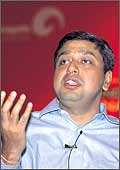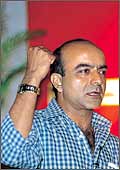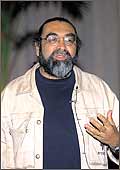 |
| Brainstorming session: (L to R) Coca-Cola
India's Sanjiv Gupta, ad-film maker Prahlad Kakkar, Professor
Jagdish Sheth, McCann-Erickson's Santosh Desai, and Amoretto's
Jayant Kochar at Business Today's Knowledge Management Forum |
Daunting
word, this-knowledge. All the more so when applied to business.
It was a good thing, then, that Business Today's Knowledge Forum,
on converting this precious intangible to hard cash, restricted
itself to the management of intellectual assets in general, and
brands in particular. The theme: 'Building Winning Brands'.
Restricted itself? Maybe not. Brands are brands.
They are about as amenable to being restricted as an idea whose
time has come. Much the same can be said about the views that marketers
and academics have on managing brands. A perfect setting, then,
for a good exchange of views among some of India's most renowned
brand junkies. It was in the fitness of things too, that Seagate,
exchange4media, and brandprophet, which helped put the forum together,
were brand junkies too.
The forum's first speaker, Dr Jagdish Sheth,
kicked off the morning session at The Imperial Hotel, New Delhi.
"Consumer product marketers are way behind industrial marketers
in understanding the branding process," said the good professor
from Emory University's Goizueta Business School, creating an instant
stir in the hall. "The only segmentation that works is price,"
he elaborated, "whilst consumer product marketers give too
much spin to demographics, psychographics et al." Further,
industrial marketers- think GE or ups-are masters of placing emphasis
on the mother brand above all, and then extending it across product
and service categories with élan. This works because to industrial
marketers, branding is process-driven, rather than a programme run
by some 'marketing department', and the brand values are reflected
in everything that they do, across functions.
 |
Jagdish Sheth
Charles H. Kellstadt Professor of Marketing,
Goizueta Business School, Emory University, USA
"Marketing was just an afterthought
to manufacturing, and, therefore, never had a capital budget
of its own, only an annual expense account. If you look at big
brand companies, manufacturing/IT have brought down their costs
tremendously, but no one yet speaks about productivity of marketing." |
Sheth also attacked that other practice that's
in vogue-of launching market-specific brands in markets with a different
cultural context. The result? An expensive portfolio. "Most
big brands in packaged goods are like huge mansions over the river
Rhine," he scoffed, "Good to live and look at, but very
high on cost maintenance." That's poor branding strategy, in
his view, and it's so much better to have one big mother brand doing
the job across the world. "The fact is, when people accept
your brand, they begin disassociating strict cultural context from
usage." Look at Wal-Mart, which has created a "truly classless
brand" by ending the price-quality trade-offs that were being
forced on shoppers. Doing this, he said, involves just about every
part of the business.
That was just the right note for the next speaker,
Coca-Cola India's Deputy President, Sanjiv Gupta, to begin addressing
the issue of 'Value Creation'. His company, after all, is known
to value branding on an almost philosophical plane-clearly something
that occupies the management at the very top level. "What we
do," began Gupta, "is strengthen the connection between
the product and the consumer. It enriches the experience of the
consumer whenever he or she interacts with the brand." In real
terms, reinforcing the brand promise is a complex job, involving
behind-the-scenes value creation through activities as diverse as
water conservation and supply-chain efficiency, as well as the upfront
engagement of the "passions of India" (cricket, for instance),
which often needs different connectors for different parts of the
country (Durga Puja in West Bengal, for example). Pricing isn't
the cola focus.
| Brands are brands. They are about as amenable
to being restricted as an idea whose time has come. Much the
same can be said about the views that marketers and academics
have on the business of managing brands |
And it's not just cola, for Gupta. There's the
low-priced Sunfil powder to make soft drinks accessible to larger
numbers, and the Georgia tea and coffee initiative-which has adapted
its flavours to the country region by region. In Gupta's view, that's
a pragmatic way to handle diversity, even if Sheth disapproves.
If passion-tapping is important, can consumer
insight generation be far behind? That's precisely what Santosh
Desai, President of Coke's agency McCann-Erickson India, spoke about.
"To my mind," he began, "insight is elusive. It's
difficult. It isn't a process thing. Insight is not about seeing
new things, but seeing old things in a new way." In that sense,
it's about originality. The sort, however, that could also be seen
to be obvious. "It is retrospectively self-evident." The
trick, he said, was not to let marketing get "too caught up
in itself", but to explore "the other 98 per cent of our
lives, as human beings" (rather than 'consumers').
 |
Sanjiv Gupta
Deputy President,
Coca-cola India.
"Where both brand and category development
is high, we believe the focus should be on price positioning
and the price target. Where category development is low and
brand development is high, we need to develop relevant insights." |
Any insight examples? Oh yes, Desai had plenty.
Cricket as a "Brahminical sport", for one. "It's
about superiority of form over content," he remarked, sending
a light flutter through the hall. Then, more controversially, marriage.
"It's about keeping intimacy at bay," he said, "it's
a relationship between two families." And then, the nightie.
In India, a symbol of "greasy modernism", yet fairly modest
as a garment.
Perhaps not the ideal point for the former
Lacoste man to begin his own speech. No problem. As the Chief of
Amoretto's, a retail enterprise, Jayant Kochar spoke on the 'Service
Attitude' rather than the social symbolism of garments. To him,
"A brand denotes values and functions", but a brand must
also have a personality, which ought to be created by the brand
positioning (broadly, the stance it strikes in consumer mindspace).
It can also be seen as arithmetic, he added. "Successful brands
deliver value. Value is equal to benefit minus cost." How does
a Rs 1,500 product deliver Rs 5,000 of value? Service.
 |
Santosh Desai
President,
McCann-Erickson India
"Brand value is nothing but the meaning
that gets attached to the product. You have a product and it
gets surrounded with additional meanings. So Coke is not just
carbonated sort of water, but has a host of meanings associated
with it." |
"You've got to fight for share of time,"
continued Kochar, highlighting the key retail challenge. "Anything
that keeps customers away is competition for us." Plus, a note
of warning: getting preoccupied by the material aspects-the convenience,
ambience and so on-risks a failure to "understand needs, communicate,
empathise, care for, and entertain the customer".
Did someone say 'entertain'? Aha. That's a
word that's almost synonymous with Prahlad Kakkar, an adfilm maker
who's spent considerable time in the cola trenches. And true to
style, his speech was a barrage of reality bytes. "You're only
as good as your last job," he started, before making his case
for letting brand integrity dictate the job. "No work is so
important that you compromise dignity and professionalism. You should
have such belief in yourself and your idea that you could walk away
if others don't believe you."
It's all about ideas, said Kakkar, and there's
no formula for that. Even if it looks nicely thought out and formulated
later. "All rationalisation is done in the hindsight,"
insisted Kakkar, "But there are no rules. There are paradoxes
to great ideas." A test of a good idea, though, is that it
should transcend execution. Further, "There are no right or
wrong decisions. There are only decision or lack of decision."
And that's plainly a matter of courage.
 |
Jayant Kochar
Managing Director
AMORETTO'S
"The customer is not always right.
Customers often act like monkeys. But you've got to treat them
well. We say the customer is King, and we also expect them to
be loyal to us. Were kings loyal to there subjects, or the other
way round?" |
 |
Prahlad Kakkar
Ad Film Maker
"You need to be flexible. The system
will bend you, if you are not agile. The greatest ads happen
by accident, not deliberation. You'll find great ads in dustbins
of ad agencies. When people have nothing to lose, they become
creative." |
| |
|

